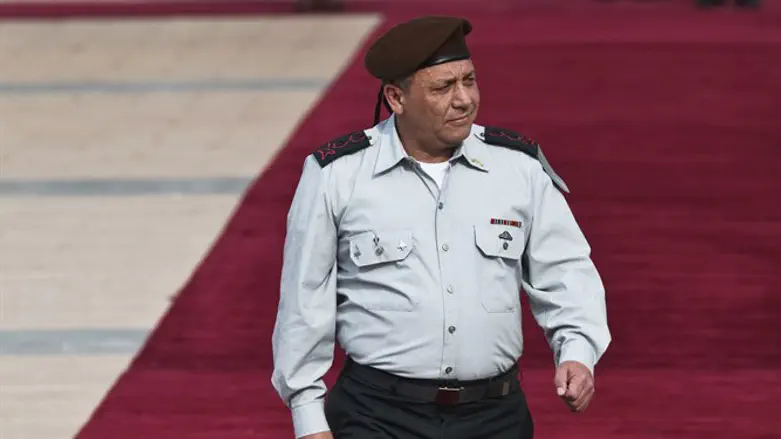
Chief of the General Staff, Lt. Gen. Gadi Eizenkot, spoke this morning, Tuesday, at the 6th annual conference in memory of Lt. Gen. Amnon Lipkin-Shahak at the Interdisciplinary Center in Herzliya.
Eizenkot referred to the continued rocket fire from Gaza in the past month, saying that "the declarations calling for much more force at this stage are not responsible, deterrence is not measured in one day, and not according to what the daily newspapers say."
"We are making an effort militarily, internationally, and in other spheres to prevent Iran from establishing itself in Syria," the chief of staff said, adding that "An Iranian foothold in Syria would be bad for Israel, Syria and Europe."
According to Eizenkot, Hamas is trying to increase terror attacks in Judea and Samaria to keep the Gaza Strip quiet. Regarding the tunnels surrounding the Gaza Strip, the chief of staff said, "We have developed a system that identifies the offensive subterranean territory into the State of Israel, and we are exerting overt and covert efforts to prevent this.”
"For more than three and a half years, no Israeli citizen has been injured, there has been a boom in the communities near Gaza, and we are making a number of major efforts to stop the shooting," said the chief of staff.
"The push I hear and the external statements, which I think are not responsible, to respond immediately with maximum force to the rockets attacks, I think that is not the right thing to do right now," he said.
"I can not ignore the very moderate drop in motivation and willingness to enlist in IDF combat units, and the younger generation has a different interpretation about what constitutes meaningful service. The ranks are full, but we are aware of the change and are making efforts to strengthen the combat ethos.”
The chief of staff stressed that "one of the reasons we succeeded in suppressing terrorism in Judea and Samaria is due to the front-line combat soldiers. All the soldiers in the past two years have behaved with great courage and focus."
According to Eizenkot, the IDF does not have a policy of “religionization” or exclusion, but on the contrary, aims "to enable meaningful service while maintaining human dignity. We need to make tremendous efforts to keep the IDF out of the debate in Israeli society. I see it as vital to the creation of a broad national consensus around the IDF. "
The Chief of Staff noted that the challenge of senior command at this time is to "deepen recruitment to the IDF, increase the scope of recruitment and adapt the army accordingly, reduce dropout from service, and continue the discourse on values for young people who enlist - cyber is important, technology is important, and the most important: combat service.”
Eizenkot also referred to Ehud Barak's statement that senior officers are liable to refuse orders because of government policy. "As one who has served for 40 years in the IDF, I do not see officers refusing orders on the basis of policy.”
"IDF officers understand the laws and the rules well. It is possible to argue and express other positions, but the moment an order is given I don’t see officers challenging the rule of Israel.”